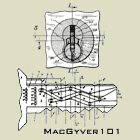NanoDuke wrote:Trichloroethylene is unstable when in contact with metals, so it might not be a viable solution (pun). Plus there are toxicity issues.
I think TCE or other organic solvents are a bit extreme when combined with ultrasonic soaking.
Either use a low-grade, cheap solvent + sonication, or a stronger solvent on it's own.
Heat is another variable to help with cleaning.
What are low-grade solvents?
Kerosene is good, but it's too stinky. Deodorized mineral spirits is basically kerosene, but with the nasty smell removed so it's much more pleasant to work with.
Trichloroethylene is a VERY common industrial metal cleaning solvent. It may react with aluminum, but you shouldn't clean aluminum in ultrasonic anyways. Put a piece of aluminum foil in an ultrasonic water filled with water and watch it disintegrate from cavitation.
Detergent-water is not very efficacious with heavily oiled parts.





